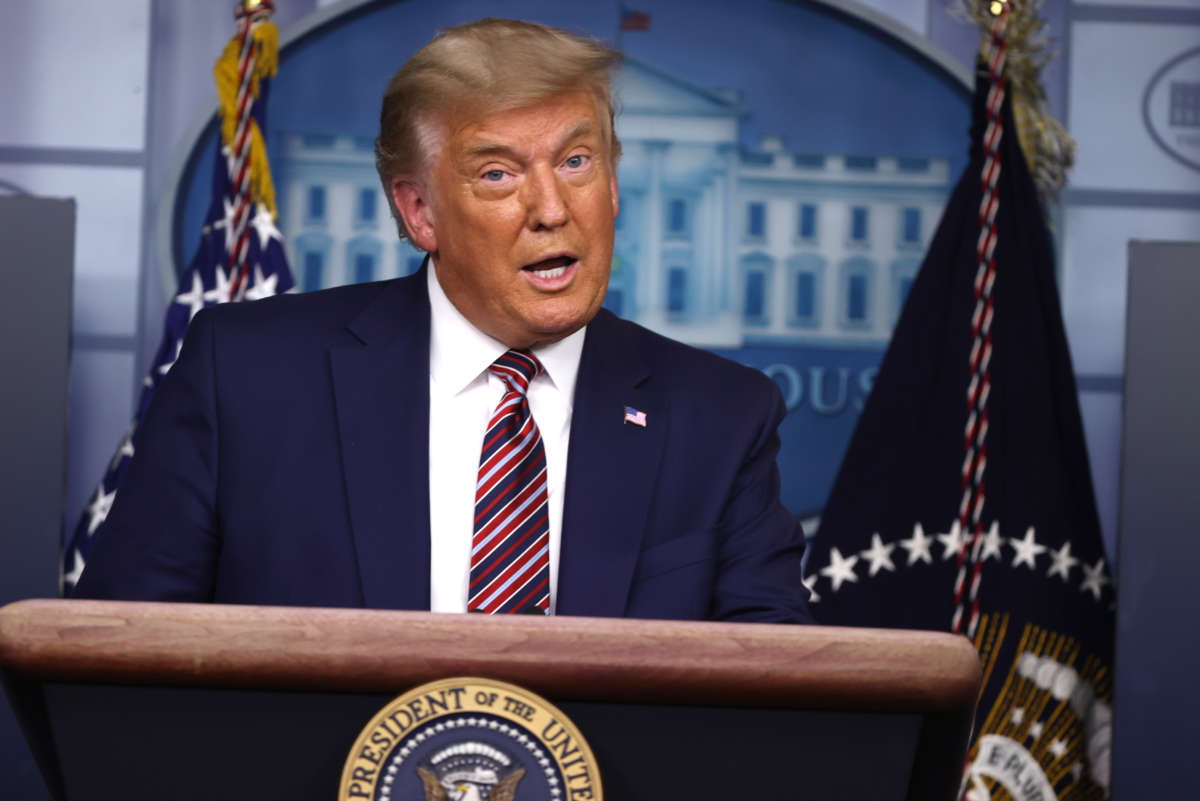Honest, paywall-free news is rare. Please support our boldly independent journalism with a donation of any size.
A Georgia election official pleaded Tuesday for President Donald Trump and other GOP lawmakers to stop spreading baseless ideas about election fraud, arguing that Trump’s rhetoric is fueling death threats against election workers. But in direct response to the request from Gabriel Sterling, the voting system implementation manager for the state of Georgia, Trump has only doubled down, making even more unsubstantiated attacks on the integrity of the election.
“This has to stop,” Sterling said in a speech at the Georgia Capitol on Tuesday, pleading on behalf of election workers under his supervision who have recently been threatened with violence online. “Someone is going to get hurt. Someone is going to get shot. Someone’s going to get killed. And it’s not right. It’s not right.”
Sterling cited an incident in which an election worker in Gwinnett County, Georgia, received death threats from social media users, including an image of a noose directed toward him.
“It has to stop. Mr. President, you have not condemned these actions or this language,” Sterling, himself a Republican, said in his speech. “Senators, you have not condemned this language or these actions. This has to stop. We need you to step up. And if you take a position of leadership, show some.”
Sterling said social media users had said the election worker “should be hung for treason” simply for doing his job. “His family is getting harassed now. There’s a noose out there with his name on it. And it’s not right,” Sterling added.
Sterling went on to denounce how those wrongly agreeing with Trump about fraud have targeted lower-profile election officials who do not receive the same protection as he does.
“I’ve got police protection outside my house. Fine. You know, I took a higher profile job. I get it, the Secretary ran for office, his wife knew that too,” Sterling said. “This kid took a job. He just took a job, and it’s just wrong.”
Trump indicated on Tuesday night that he was aware of Sterling’s press conference. But rather than condemn the violence that the election official spoke of, or rein in his baseless claims of fraud, the president actively fueled the conspiracy theories he has been promoting for the past several weeks since Joe Biden was declared the winner of the 2020 presidential race.
“Rigged Election. Show signatures and envelopes. Expose the massive voter fraud in Georgia,” Trump tweeted, quoting a video of Sterling’s speech in the same post. “What is Secretary of State and [Georgia Gov. Brian Kemp] afraid of. They know what we’ll find!!!”
The fraud claims that Trump made in his tweet have already been debunked by a number of fact-checking websites. Absentee voters’ signatures were checked twice in the Georgia election, and checking them again is impossible, as ballots and envelopes were separated after those checks were made to ensure every voter’s right to a secret ballot.
Meanwhile, election workers in a number of states — not just Georgia — have begun facing harassment and threats from those agitated by Trump’s rhetoric. Threats against election workers in Pennsylvania, Nevada, Michigan and Arizona have also been reported, according to an analysis from PBS’s “Frontline” program.
“What we’re seeing this year — more than we have historically — is we have, thus far, baseless accusations of fraud and an unwillingness to acknowledge the results as being what they are,” Benjamin Hovland, the chairman of the U.S. Election Assistance Commission, told the program. “You’re seeing that spin out on social media, in particular. You’re seeing it be amplified and various pieces of mis- or disinformation being thrown in — various conspiracy theories about the election administration process.”
Trump’s lawyers have engaged in violent rhetoric, too. Earlier this week, Trump campaign lawyer Joseph diGenova singled out former Cybersecurity and Infrastructure Security Agency (CISA) director Christopher Krebs, saying he deserved to be “drawn and quartered” and “shot” for implying the election was conducted securely.
DiGenova also implied that “anybody who thinks the election went well” is guilty of acting just as Krebs has.
As has been demonstrated in dozens of court challenges on Trump’s behalf, there is no substantial evidence that fraud of any kind interfered with this year’s elections.
“Charges of unfairness are serious. But calling an election unfair does not make it so,” wrote United States Third Circuit Court of Appeals Judge Stephanos Bibas, a Trump appointee, in a court opinion last week regarding the president’s allegations. “Charges require specific allegations and then proof. We have neither here.”
A terrifying moment. We appeal for your support.
In the last weeks, we have witnessed an authoritarian assault on communities in Minnesota and across the nation.
The need for truthful, grassroots reporting is urgent at this cataclysmic historical moment. Yet, Trump-aligned billionaires and other allies have taken over many legacy media outlets — the culmination of a decades-long campaign to place control of the narrative into the hands of the political right.
We refuse to let Trump’s blatant propaganda machine go unchecked. Untethered to corporate ownership or advertisers, Truthout remains fearless in our reporting and our determination to use journalism as a tool for justice.
But we need your help just to fund our basic expenses. Over 80 percent of Truthout’s funding comes from small individual donations from our community of readers, and over a third of our total budget is supported by recurring monthly donors.
Truthout has launched a fundraiser, and we have a goal to add 242 new monthly donors in the next 48 hours. Whether you can make a small monthly donation or a larger one-time gift, Truthout only works with your support.
